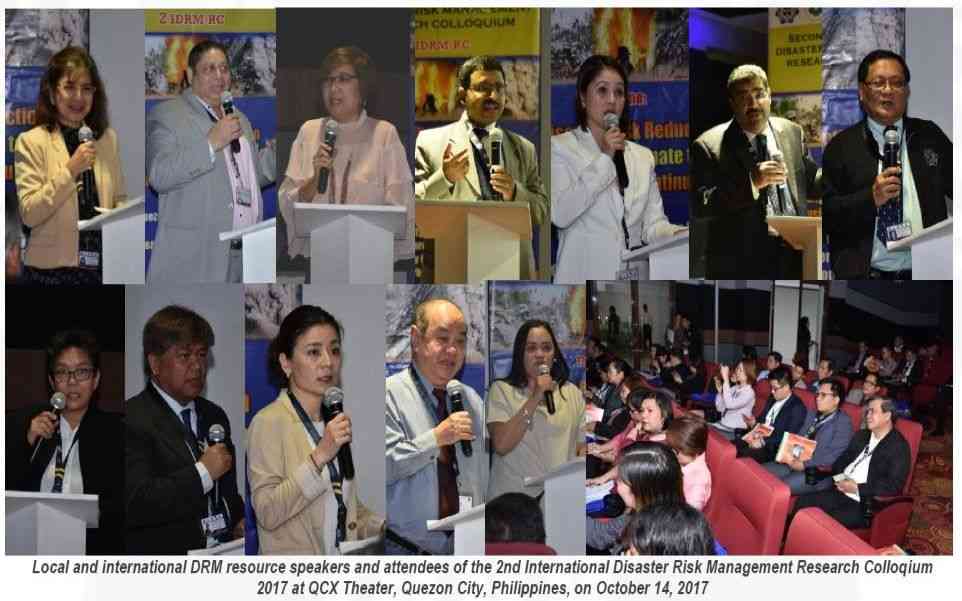International DRM Research Colloquium on Disaster Risk Reduction in a Changing Climate towards Business Continuity
In line with the celebration of the International Day for Disaster Risk Reduction on 13 October, the research colloquium gathers guests and speakers from around the world for a meaningful exchange on DRR
Description
This initiative was set to disseminate knowledge that the exposure of people and assets to disasters is on the rise, leading to new risks, and increased economic and human losses. It is aligned with the Sendai Framework for Disaster Risk Reduction which advocates for the engagement of all of society. Paragraph 7 of the Framework in particular calls for a broader and more people-centered preventive approach read as "The public and private sectors, civil society organizations, academic, scientific, and research institutions are each called upon to work more closely and to create opportunities for collaboration. " It is for businesses to integrate disaster risk into their management practices. Thus, this commitment is to internationally share applied research and practical knowledge through the celebration of the International Day for Disaster Risk Reduction on 13 October 2017 which aims to create awareness and recognition of the importance of disaster risk reduction in building resiliency towards sustainable development. More than 100 international delegates and speakers from various countries participated in this international research colloquium. It was concluded that Disasters can severely impact private and public firms. While having a business continuity plan is an effective solution to mitigate damage to operations when disasters hit, proactive strategies to reduce the risk of disasters are essential to ensure long-term competitiveness and sustainability.
Did the Sendai Framework change or contribute to changes in your activities/organization? If so, how?
The Sendai Framework priority 3: Investing in Disaster Risk Reduction (DRR) for resilience read as “… (o) To increase business resilience and protection of livelihoods and productive assets throughout the supply chains, ensure continuity of services, and integrate disaster risk management into business models and practices”. Indeed, it became the road map for this initiative and It is due to the reason that the DRR strategy needs to be integrated into standard business solutions, together with measures to adapt to climate change variability and economic challenges. Investing in DRR reduction ensures business continuity, safeguards long-term investments, and provides protection to individuals, communities, and environments
What led you to make this commitment/initiative?
What was your position before making this Voluntary Commitment / prior to the Sendai Framework?
Hyogo Framework for Action: gaps identified and future challenges (7th paragraph) expressed in and read as “There is a need for the public and private sectors and civil society organizations, as well as academia and scientific and research institutions, to work more closely together and to create opportunities for collaboration, and for businesses to integrate disaster risk into their management practices”. This entitled us to continue our advocacy for this kind of event as an integral part of DRM formal education in collaboration with our partners. We have committed to spreading formal DRM education to local and international citizens. This aligns with the Hyogo Framework of 2005-2015 and its continuation, the Sendai Framework of 2015-2030, citing the need for DRM to be incorporated in public and private institutions, including academia.
Deliverables and Progress report
Deliverables
Deliverables are the end-products of the initiative/commitment, which can include issuance of publications or knowledge products, outcomes of workshops, training programs, videos, links, photographs, etc.
The end product of the colloquium is the "2nd IDRM- RC Proceedings" consisting of abstracts and frameworks presented during this unique platform by our School’s Research Fellows, students and experts from the local and international institutions, representatives from local and international partner schools, public and private organizations. The proceedings can be accessed at: https://psba.edu/wpcontent/uploads/2018/09/Second-International-DRM-RC.pdf
Organizations and focal points
Implementing Organization(s)
- Philippine School of Business Administration
- Quezon City Local Government
- University of the Philippines
Focal points
If a VC's contact information has been hidden, the SFVC team can forward a message.